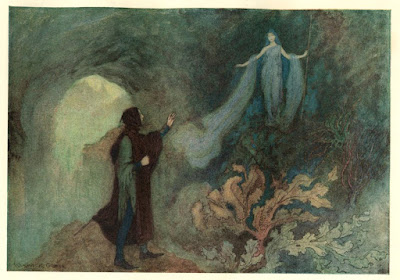Author and artist Frederick Richardson was highly influenced by the Art
Nouveau movement, as reflected in his exquisite illustrations for "The
Three Bears," "The Bremen Town Musicians," "The Little Red Hen," and "The
Straw Ox,"
The Straw Ox is a Russian Folk Tale.
THERE was
once upon a time an old man and an old
woman. The
old man worked in the fields as a pitch
burner,
while the old woman sat at home and spun
flax. They
were so poor that they could save nothing at all;
all their
earnings went in bare food, and when that was gone
there was
nothing left. At last the old woman had a good idea.
" Look,
now, husband," cried she, " make me a straw ox,
and smear
it all over with tar."
" Why,
you foolish woman !" said he, " what's the good of
an ox of
that sort ?"
" Never
mind»" said she ; " you just make it. I know what
I am about."
What was
the poor man to do? He Set to work and made
the ox of
straw, and smeared it all over with tar.
And
while she spun, her head
drooped
down, and she began to doze, and while she was dozing,
from behind
the dark wood and from the back of the huge
pines a
bear came rushing out upon the ox and said:
" Who
are you ? Speak and tell me !"
And the ox
said: " A three-year-old heifer am I, made of straw and smeared with tar."
" Oh !
" said the bear, " stuffed with straw and trimmed with
tar, are
you ? Then give me of your straw and tar, that I may patch up my ragged fur
again !"
“ Take
some," said the ox, and the bear fell upon him and began to tear away at
the tar.
He tore and
tore, and buried his teeth in it till he found he couldn't let go again. He
tugged and he tugged, but it was no good, and the ox dragged him gradually off,
goodness
knows where.
And
while she spun, her
head drooped down, and she dozed. And, lo ! from
behind the
dark wood, from the back of the huge pines, a gray
wolf came
rushing out upon the ox and said:
" Who are you ? Come, tell me !"
"I am
a three-year-old heifer, stuffed with straw and
trimmed
with tar," said the ox.
Then a fox
came running up. "Who are you?" it asked the ox.
" I'm
a three-year-old heifer, stuffed with straw and daubed with tar."
" Then
give me some of your tar to smear my sides with,
when those
dogs and sons of dogs tear my hide !"
" Take
some," said the ox. Then the fox fastened her teeth
in him and
couldn't draw them out again. The old woman
told her
old man, and he took and cast the fox into the cellar
in the same
way. And after that they caught Pussy Swiftfoot
(the Hare)
likewise.
So when he
had got them all safely the old man sat down on
a bench
before the cellar and began sharpening a knife. And
the bear
said to him:
" Tell
me, daddy, what are you sharpening your knife for?"
" To
flay your skin off, that I may make a leather jacket for
myself and
a pelisse for my old woman."
" Oh,
don't flay me, daddy dear ! Rather let me go, and
I'll bring
you a lot of honey."
" Daddy
!" cried the old woman, " there's some one scratching
at the door
; go and see who it is !"
The old man
went out, and there was the bear carrying a
whole hive
full of honey. The old man took the honey from
thr bear...
...but no
sooner did he lie down than again there was
another "
Durrrrr ! " at the door. The old man looked out and
saw the
wolf driving a whole flock of sheep into the courtyard.
Close on
his heels came the fox, driving before him
geese and
hens, and all manner of fowls ; and last of all came
the hare,
bringing cabbage and kale, and all manner of good
food. And
the old man was glad, and the old woman was glad.
And the old
man sold the sheep and oxen, and got so rich that
he needed
nothing more. As for the straw-stuffed ox, it stood
in the sun
till it fell to pieces.





























































